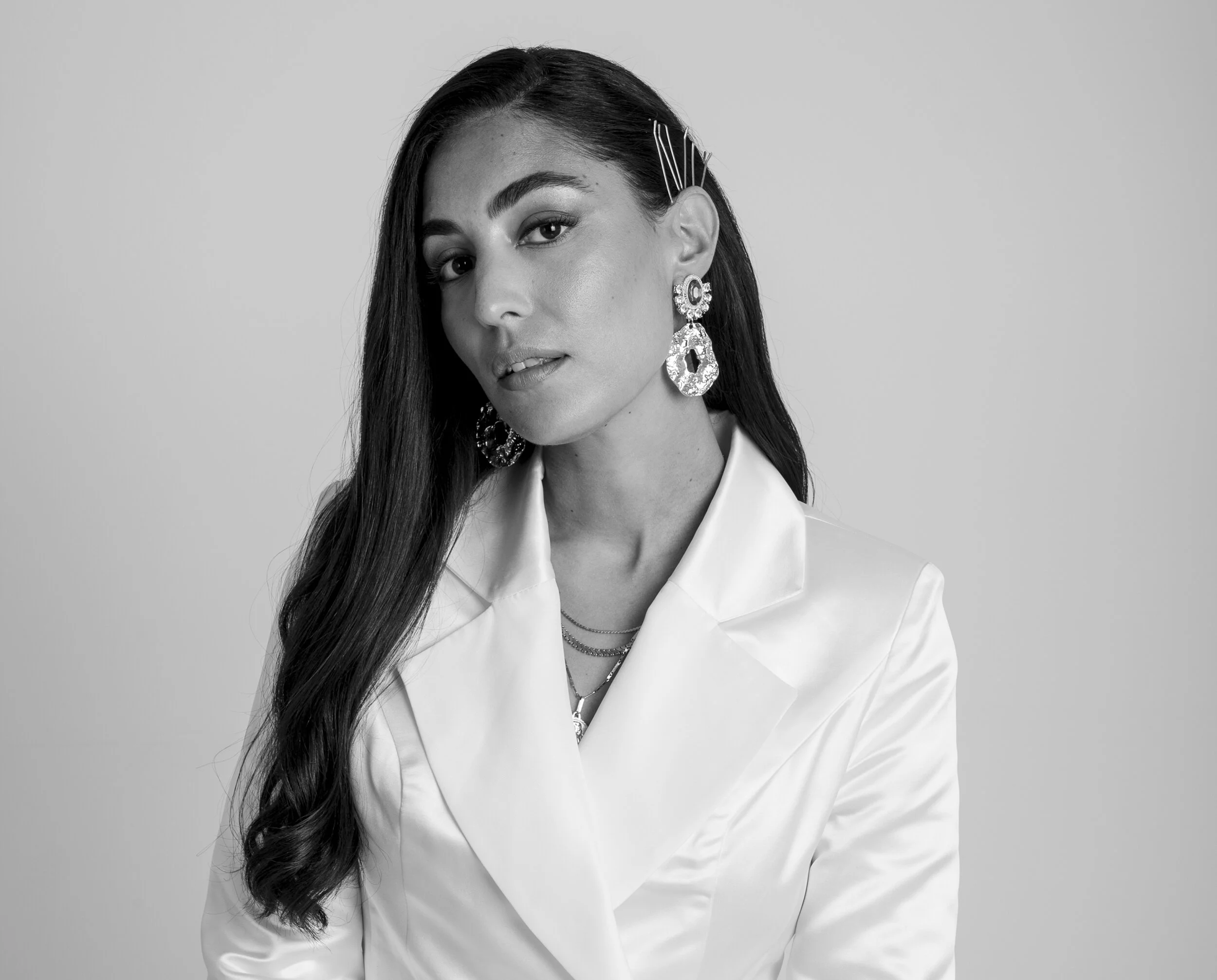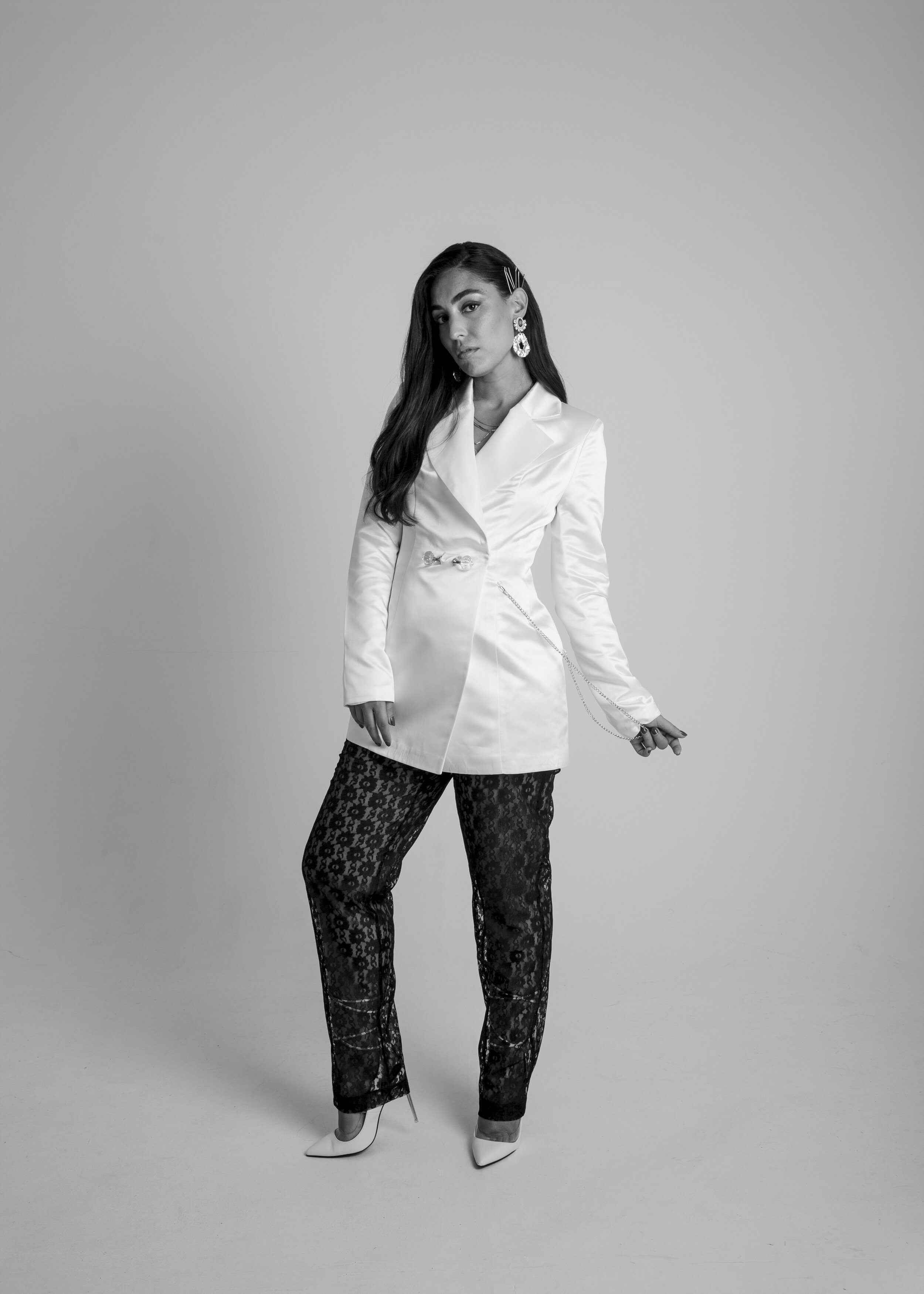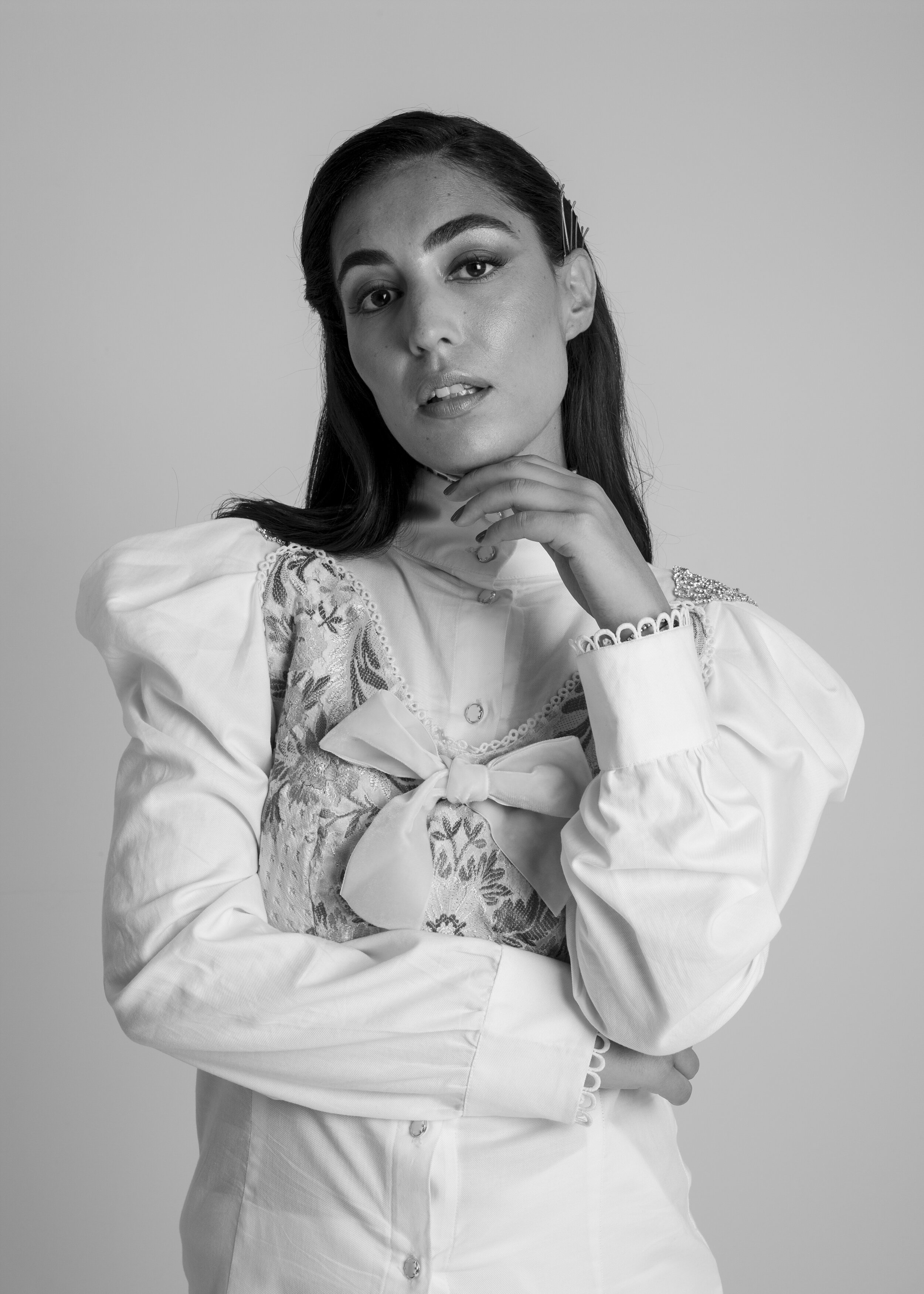Journalist Alya Mooro embarks on a journey to broaden the narratives attached to Middle Eastern Women
Alya Mooro, author of ‘The Greater Freedom: Life as a Middle Eastern Woman Outside the Stereotypes’
Everyday we battle the opinions and judgments of others. Some may actually be positive, others not so much but either way is it right? Is it fair for us as individuals, to walk into new spaces and have our identities preconceived before we’ve even introduced ourselves? It’s as though the human brain literally sees everyone as a riddle, an analogy with the need to make absolute sense and if not, something isn’t quite right. Perhaps there are just exceptions to these societal based judgments or maybe, just maybe these preconceptions are in fact outdated and incredibly flawed.
As a Cairo born, London raised Muslim woman, journalist Alya Mooro has faced her fair share of stereotypical bias. To many, an individual such as herself shouldn’t even exist but here’s the thing, she absolutely does. Here stands a highly educated Middle Eastern woman, with a BA in Sociology and Psychology and a Masters in Journalism. She’s not yet married, doesn’t wear a veil and guess what, she drinks alcohol just like many other young adults living in today’s world. Now what’s really interesting, is the fact that Alya’s lifestyle as a young and modern Arab woman is common among her peers in Egypt however, out here in the West she’s coined as some type of anomaly - but why is this? Members of society only know what they are told, along with intelligence they personally choose to research and learn for themselves but lets face it, for many, the latter will only happen on a need to know basis. The common narrative of a Middle Eastern, Muslim woman is one who is oppressed and controlled by man. This stereotype becomes the accepted norm and anything left of this is seen to be strange. When narratives about people of colour are actually shared and told, it’s usually not an authentic account. Perhaps this is because the people behind the scenes are not of colour or of the culture themselves, causing further opportunity for misrepresentation to occur. It’s for these reasons and more, Alya saw it as her purpose to share her own narrative and she did just that, with the release of her debut book ‘The Greater Freedom: Life as a Middle Eastern Woman Outside The Stereotypes.’
Our photo shoot with Alya was a lot of fun. She had desires of becoming a model in the past and so embodied true comfort in front of the camera. She was effortlessly poised throughout and absolutely loved the glam by make-up artist Tahiyah Ali and hair stylist Maeve McElholm. I’ve personally known Alya for many years and as we kicked off our chat for this interview, I cast her mind back to a lunch meeting we had a good 3/4 years ago, when she had told me how much she admired Kim Kardashian. “What I love about the Kardashian’s and Kim, is that they can do anything,” explains Alya. “Anything that they decide they want to do, they do it. She’s studying to be a lawyer now, which I find amazing.” It is pretty impressive and as a family of very successful businesswoman, it just goes to show what women can achieve if placed in a position of influence. The Kardashian’s have broken the ‘stay in your lane’ mould and Alya tells me that’s what she wants herself, to be able to change lanes and explore all her interests, and for it not to seem random or weird. With Kim Kardashian being of Armenian heritage (which although isn’t Arab, Armenian’s do have a similar appearance to Arab people), I asked Alya if she felt as though she could see herself in Kim K, “100 percent,” she expressed. “Something that I touched on in my book as well. When J.Lo started to become a thing and the Kardashian’s after that, it definitely made me feel the most seen than I ever had before.” Back in the 90’s / early 2000’s representation for women of colour and also women with curves and shape was extremely scarce in the mainstream media. “Growing up, that was something that I felt quite insecure about,” admits Alya. “I was always like ‘oh my thighs, my bum’ and it’s so funny now because that’s what’s in.” Alya continued to explain that the shift in beauty ideals from blonde hair, blue eyed and ‘stick thin’ to exotic and ‘thick’ were in part because of the likes of J.Lo and the Kardashians, “I definitely felt like they were some of the first people in the mainstream that I could look to and sort of be like oh we have the same kind of colour skin, we have the same sort of look. It helped me find beauty in myself for sure.”
I’m sure most would agree, Alya has undeniable beauty. Sun kissed with olive skin tones, her long dark hair hangs with a natural bounce and her face bares the purity of a stunning Egyptian woman, I wondered if she ever struggled with finding her own beauty. Alya explained that she was actually quite fortunate, beauty was never something she obsessed about growing up and she wasn’t the type of person that would sit in the mirror and pick herself apart, “I know people like that and it’s tiring,” she shares. “It’s not nice to see yourself and not like what you see.” She continued to explain that her mother was always quite confident and didn’t wear much make-up. Its evident Alya has adopted the same approach with her own beauty, as she too, keeps her make-up very natural. One thing she has struggled with though, is her hair. “My hair is really curly and that has been a real battle, especially now I’m trying to like it and wear it curly more often,” she admits. “In Arab culture, straight hair is definitely considered more beautiful and we’re supposed to always have blow-dries.” Alya continues to share details of the times she was forced to have the YUKO system, a really intense Japanese hair straightening treatment, which takes 8 hours. “I was 12 the first time I did that and I did it for years and years, I’ve only just stopped as I was writing my book,” she explains. “I have a whole chapter about these ideals that we’re supposed to ascribe to, first and foremost this hair thing and I just thought fuck that, I’ve been brainwashed. Let me try and get out of that conditioning.”
The need to not have any body hair was another ideal Alya mentioned. She tells me of a time she remembers as a young child, before she started shaving or waxing. A friend had called her out for having hair on the back of her neck. “Now I’ve realised so do you (the friend) it’s just blonde,” Alya details with a chuckle. “I remember feeling really upset by that and I put my hair down, I didn’t want anyone to see.” A scenario such as this would most likely instil some insecurities into a young child and for Alya then, this was very much the case. “I have so much more to offer the world than what I look like,” she explains. “I hope for the younger generation, we don’t actually place so much importance on what we look like but actually, on who we are.”
Blazer + Trousers by Bogdan Daria, Shoes by Public Desire, Earrings by épifenē and Necklace by Dixiegraze
We continue to chat more about the ideals of Arab beauty and how things such as hair straightening and hair removal, came into existence. Alya shared her thoughts that it’s due to the fact, the British and the French colonised a lot of the Arab countries. “Ideals of beauty have started in the West and they’ve spread around the world,” she tells me. “There’s skin bleaching, people trying to be lighter, a lot of people trying to fit in with these ideals that the West have dictated.” For years we’ve been conditioned to believe that white is better, leading to an epidemic of self-hate towards darker skinned people. Slowly but surely things are beginning to change and it’s because people of colour are beginning to exist, where they perhaps didn’t before. “I think what’s so amazing now is obviously there is a lot more representation,” shares Alya. “I heard someone yesterday say diversity is the wrong word. Actually it’s representation because we are here.”
From the title of Alya’s book, my initial thoughts was that it would be a memoir of her experiences and challenges, navigating between two completely different cultures and having to live up to the expectations required from both. My assumptions however, were somewhat incorrect. Alya had set out to accomplish two things with her book, the first was to challenge the stereotypes of who she should be. She takes religion as an example and explains that there are so many different ways of practicing or not practicing one’s faith, even within the Muslim community. She explains that we wouldn’t necessarily stereotype an English person to look a certain way, just because they are Christian but unfortunately, instantaneous judgments arise when it comes to Arab and Muslim individuals. Alya goes on to detail the common stereotypes of an Arab woman; veiled from head to toe, meek and docile, not able to speak up for herself and probably, likely to be the wife of a terrorist. All of which completely contradict Alya’s existence. Uber drivers would question her ethnicity, assuming she was Spanish because she’s not veiled. Her Islamic faith would be challenged because she’s out drinking, according to others and their ingrained stereotypes, she’s not Muslim enough to be a Muslim. “I think it’s really important especially now with all this fear of the other and Islamophobia, to provide alternative narratives because I exist,” states Alya. “I have so many friends who are like me, there are so many shades of being.” She continues by detailing a review that was left on Amazon about her book, where a lady had stated that Alya obviously didn’t count as an Arab woman because her experiences, opinions and upbringing were too liberal. “It really goes to show, firstly how important it is to have more narratives because the fact that you (the book reviewer) think that I’m not Arab because I’m not oppressed is shocking,” defends Alya. “I can’t represent every single Arab in the whole entire world, that’s not what I’m trying to do.” She continues to explain that with so many white stories in existence, it’s a lot easier for white people to feel seen and represented whereas, with so little representation within the Arab community, it’s almost as though she’s expected to speak on behalf of them all. “No, my story is valid, I exist - this is actually my life experience,” she expresses. “I know a lot of people who feel the same things I do and have had the same experiences I had and just because it doesn’t tie in with those stereotypes, it doesn’t make it any less valid.”
The second thing Alya was attempting to achieve with her book, was to discuss some of the challenges of being a woman. In writing the book she quickly realised, some situations were happening not necessarily because she was Arab, it was because she is a woman. “I’m expected to look a certain way, all women everywhere have that,” she states. “I’m supposed to be a virgin until I get married. In my culture that’s how it’s supposed to work but then at the same time in the West there’s slut shaming and double standards. T.I even just stated that he takes his daughter to the gynaecologist to have her hymen checked, so it’s not really all that different.” She’s right, women everywhere are oppressed to some degree. “Arab women maybe in some ways, have less rights in some things than women elsewhere do but then at the same time, we still have the gender pay gap,” Alya explains. It’s all these type of scenario’s which women of all cultures face, that Alya wanted to discuss in her book. “Each chapter kind of touches on a different thing; when you cant see yourself, when you learn how you’re supposed to look, when your supposed to be a virgin until you get married, when your supposed to get married ASAP,” details Alya. “All of these kind of things which I wanted to explore, talk about the complications and how both cultures affected my life in those ways.” I suggested that the book is somewhat of a guide for all women, depicted by Alya’s very own personal stories, “yea exactly,” she agrees. “I think what’s been so lovely is that I can’t tell you how many messages I’ve been receiving. A lot from young Arab women, a lot from Indians, African, loads of different kind of cultures because there’s so many similarities and so many people are really relating.” Which was Alya’s intention, she wanted women everywhere to feel seen and to unpick some of the ideals they themselves may have been told. “If you believe something then that’s totally fine, you do that,” she clarifies. “If you don’t believe it and you’ve just been brainwashed almost by society at large, to think that you should be a certain way, then think about that. Is that really what you want to do? If it’s not, then maybe you have some space to kind of change that.” Women young and old have been connecting with Alya’s book. One woman expressed that the book has really made her think about how best she can support her two young daughters, instead of just passing on outdated expectations and judgments which she herself, perhaps doesn’t even believe. “People are relating and it’s making them think about themselves and how they want to live their lives,” states Alya. “That’s what we all should do you know, unpick all the societal learning’s that since a very young age, we are taught.”
I asked Alya to detail how she came about writing her book. As a journalist she was obviously always writing however, never before about these specific subjects. She explained that as she grew older, she started to feel the pull of her two cultures. Important decisions around marriage for example, became a situation. She’s supposed to marry an Arab, Muslim man but she dates who ever she wants, regardless of their race or religion. This prompted Alya to question herself, “I was like oh ok, this is interesting. How do I fit into this?” Increasing issues of Islamophobia was another driving force for Alya to pen her book. “I’m allowed to have this conversation, my parents are really open minded, I’m a journalist like this is what I do,” she states. As a member of the Arab and Muslim community and with a family she considers to be very liberal, she pretty much saw this as her call of duty. “How in the actual hell can I not contribute to this, what am I waiting for? Who is going to do it instead?”
Shirt + Top by ANA LJUBINKOVIC, Trousers by U M E L O N D O N and Shoes by ASOS
With a tight deadline to deliver her first draft, Alya literally locked herself in her house for months. She followed a strict routine and pretty much only left the house for workouts at the gym or to visit her family. The occasional dinner with friends would result in Alya departing early because she was completely obsessed with her book. “Words were coming out of me,” she details. “I started writing poems because I just had so many words coming out of my fingers, it was really crazy.” She tells me that she found the process very cathartic, going back in time and completely analysing every single life experience that she had. “There’s this chapter in there about the guy I lost my virginity to who was a piece of shit and I called him Satan in the book,” she shares. “It was a really crazy experience, the whole thing was quite nuts but I wasn’t in my feelings about it, was almost like I saw everything from this higher place.” It’s these very untold stories by young and perhaps vulnerable women that should be discussed openly across all cultures, with the hope that guidance is passed on from one to another. “I think it’s really important to have more conversations about sex from a young age, instead of shaming each other,” shares Alya. She goes on to explain that the purpose of her book wasn’t to expose her inner and darkest secrets, it was an opportunity for Alya to cast her mind back through difficult experiences, from a very elevated position. She was able to look at the factors that allowed each situation to play out the way it did and honestly question, how and why. This was something Alya needed to do for her own personal growth and healing but she also wanted it to be useful for others as well. “I wrote it for myself, literally,” she admits. “In the dedication it says for the fifteen year old me/we.”
With so much enlightenment and healing from past experiences, I asked Alya if she felt some of her narratives would have changed if she had read her book as a young girl, “honestly so much,” she tells me. “Firstly I wouldn’t have felt so much shame, I think I would have definitely made better decisions in many things. I had this voice in the back of my head, which came from my culture and society at large,” which Alya describes in her book as the ‘invisible jury.’ “Now I don’t have it, writing the book made me get rid of it.” Alya continued to explain that she was able to identify where this internal voice was coming from and decided to pay it zero attention. “I don’t give a shit. I’m muting you,” was Alya’s attitude. “I think I would have been able to do that from a lot younger of an age, had I read or written it earlier.”
As I mentioned earlier, as people of colour we require more narratives for our representation to be better balanced. With the success of Alya’s debut book, she tells me that she plans to do more, “I want to tell more stories, I want to keep providing nuance. Even like a TV show or a novel. It’s really important to provide alternative narratives and for people to see themselves.” Alya goes on to tell me about ‘Ramy,’ an American comedy-drama series written by her good friend Ramy Youssef, an American-Egyptian stand-up comedian and writer. The show follows a first generation American Muslim from New Jersey and explores the challenges he faces, being caught between his Egyptian community and a millennial generation. I watched the trailer and it looks really good, it’s also been renewed for a second season. “I cried watching the first episode” shares Alya. “I was like oh my god, I’ve never seen something like this before in English and it’s so important.”
Alya spent a great deal of time doing research for her book, as well as interviewing and speaking to many different types of women. So I asked her what she felt she learned through the process, “that I’m right,” she states confidently with a huge smile. “These experiences are universal across culture and across religion, I think that was a really important takeaway for me and hopefully the readers will get as well.” She also acknowledged, a lot of the situations she speaks about in her book, have been going on for a very long time. “There is an author that I love called Nawal El Saadawi, she’s an 88 year old Egyptian feminist and she wrote this book called ‘The Hidden Face of Eve’ that came out in the 1960’s,” Alya tells me. “What was mind boggling when I was reading it, was how much I was still able to relate, even though it’s been a whole fucking bunch of years since then. We have made a lot of progress across the world for women’s rights but there’s still so much left to do.”
Jumpsuit by ANA LJUBINKOVIC and earrings by épifenē
We discuss the complexities around people being able to just be themselves, especially where society maybe against their truth. Alya finds it really sad that for so long, people have been told how to be and it’s generally just accepted as that’s just the way it is, “what was so amazing in writing this book, is that I started to question that,” details Alya. “Why is that the way it is, says who? Why do we have to just agree? Maybe we can make our own decisions and our own rules, instead of just blindly following what someone said many years ago.” I challenge Alya’s perspective by asking, does she not feel as though it’s necessary for some control to be instilled, to keep people in order? She tells me that she was having this very conversation with her grandfather, whilst they were discussing her book. He believes that people do need to be controlled, human nature is not of good and without control we would all become murderers and rapists. Alya disagrees, “I would like to think that most people are good people,” she shares. “We have our own judgment, our own morals and we have our own ways of being, that we wouldn’t step outside of. It doesn’t need to be because it’s been dictated to us. We have our own ideas of what’s right and wrong. I hope that’s enough.”
The Greater Freedom: Life as a Middle Eastern Woman Outside the Stereotypes by Alya Mooro is published by Little A and available in paperback for £7.99. Click here to order your copy of the book now.
CREDITS
Photographer - Aynrand Cosette Ariel
Photographer Assistant - Sophie Randle
Stylist - Jeff Maranon
Assistant Stylist - Nkemdilim Ezenekwe
MUA - Tahiyah Ali
Hair Stylist - Maeve McElholm
Special thanks to Smith Town Studios







